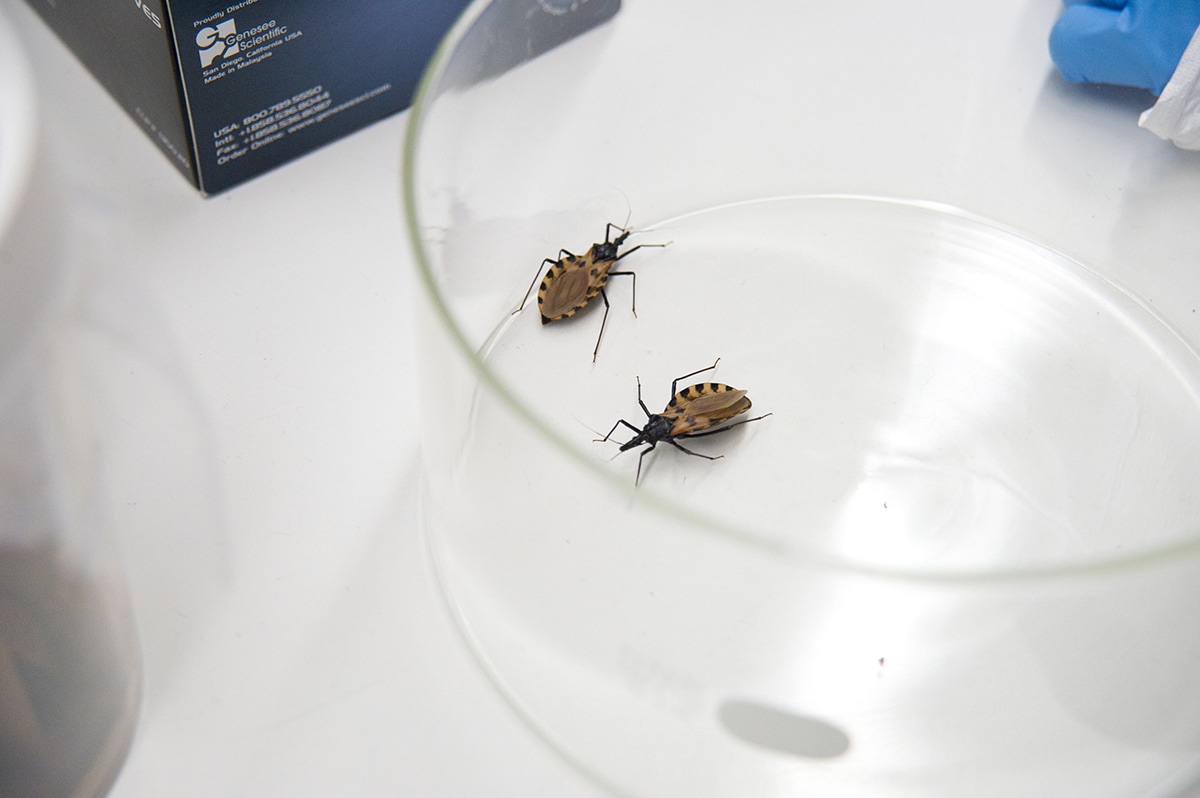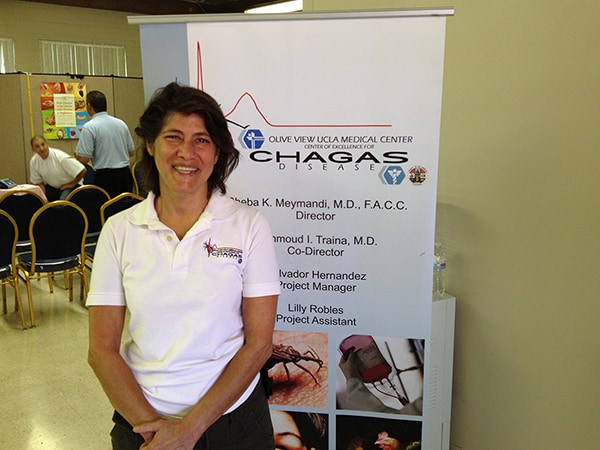International Chagas Day

Shown here are triatomine bugs of the species Triatoma dimidiata, which are found from Mexico down to northern South America. This species of triatomine is one of four that CDC maintains as colonies and provides to researchers around the world.
International Chagas Day
The annual observance of International Chagas Day on April 14 highlights the global health impact of this serious infectious disease. The disease, which is caused by the parasite Trypanosoma cruzi (T. cruzi) and spread by infected triatomine bugs, also known as kissing bugs, can cause heart failure, stroke, and even death. The World Health Organization estimates 6–7 million people have Chagas disease; as many as 10,000 people die from the disease each year.
The triatomine bugs that spread Chagas disease are found primarily in parts of Mexico, Central America, and South America, but people with the disease live throughout the world. In the United States, approximately 300,000 individuals have Chagas disease and, because the disease can be transmitted from mother to baby during pregnancy, as many as 300 infected babies are born with the infection each year in the U.S.
The infection that causes Chagas disease can be treated. However, because most people who are infected don’t have symptoms, it is important that healthcare providers recognize their patients who might be at risk. CDC is working to ensure physicians and nurses have resources available to help them identify and treat patients with Chagas disease.
CDC conducted surveys of healthcare providers, and found that many lack awareness of Chagas disease or that their patients may be at risk.
Partners in the Field
To improve outcomes of persons with Chagas disease, CDC decided to focus first on improving healthcare provider awareness. In 2015, CDC offered a grant opportunity for outside collaborators to address neglected parasitic infections, including Chagas disease. The grant, “Reducing the Burden of Neglected Parasitic Infections in the United States through Evidence-Based Prevention and Control Activities,” was awarded to three partners over a five year period.
Awardees at Albert Einstein College of Medicine, Baylor College of Medicine, and the University of Texas Health Sciences San Antonio have designed and begun to distribute a variety of educational materials and targeted messages to improve clinical awareness and to enhance public health capacity to address Chagas disease and other neglected parasitic infections.
In New York, where there is a large population from areas with Chagas disease, Drs. Christina Coyle and Herbert Tanowitz of Albert Einstein College of Medicine have organized panels of international experts to discuss diagnosis and management of Chagas disease. The talks will be recorded and made available online as continuing education courses for both physicians and nurses. In addition to these lecture panels, the team at Einstein has been visiting academic and clinical practice sites in the New York City area to provide trainings and guidance to providers on diagnosing Chagas disease in their patients at risk.
Dr. Morven Edwards, an infectious disease pediatrician at Baylor College of Medicine, has dedicated her efforts to increasing awareness of Chagas disease among doctors and nurses working with women and children at risk for the disease. One example of Dr. Edwards’ work is a presentation she gave to clinicians at Driscoll Children’s Hospital in Corpus Christi, Texas. This presentation garnered significant media attention, including coverage on KIII-TV, South Texas’ ABC affiliate.
Dr. Paula Stigler Granados and colleagues at the University of Texas have created a Texas Chagas Disease Task Force. The group is composed of experts including physicians, veterinarians, public health practitioners, and entomologists. These task force members—including several from Texas military installations—have come together to create region-specific education and outreach materials, such as a manual to help people identify the triatomine bugs in Texas that can transmit the infection. The task force also is creating a variety of educational materials targeted to healthcare providers, veterinarians, and the public to increase awareness and educate about ways to prevent and control Chagas disease.
In addition to the cooperative agreement, CDC has several other projects to help raise awareness and improve control of Chagas disease. These include research to better define the burden of disease, development of continuing medical education units, and creation of more refined patient and provider educational information. One key collaboration is with Dr. Sheba Meymandi at Olive View UCLA Medical Center in Los Angeles, CA. Dr. Meymandi recognized that many communities in the Los Angeles area were made up of people at risk for Chagas disease and she started the Center of Excellence for Chagas Disease at Olive View, offering comprehensive patient services—including cardiology, maternal child health, and infectious disease expertise—as well as community-level screening programs to encourage people at risk to get tested and to provide a place for them to obtain appropriate medical care if they test positive.
CDC has supported Dr. Meymandi’s work by performing confirmatory laboratory testing and supplying patients with Chagas treatment drugs that are otherwise unavailable in the United States. CDC has also collaborated on several studies that Dr. Meymandi has conducted, including one defining the Chagas-related cardiac disease burden in patients cared for at Olive View. Several recent publications have reported the results of her important work.
In addition to work with partners to improve outcomes for people with Chagas disease by increasing healthcare provider knowledge, CDC continues to respond to questions from healthcare providers and public health professionals about diagnosing and managing patients with Chagas disease, provides confirmatory diagnostic testing, and ensures that treatment drugs are made available for U.S. physicians treating patients with Chagas disease.























.png)









No hay comentarios:
Publicar un comentario